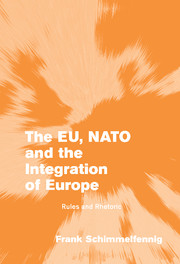Book contents
- Frontmatter
- Contents
- List of figures
- List of tables
- Acknowledgments
- List of abbreviations
- Introduction
- PART I Security, power or welfare? Eastern enlargement in a rationalist perspective
- PART II Expanding the Western community of liberal values and norms: Eastern enlargement in a sociological perspective
- PART III Association instead of membership: preferences and bargaining power in Eastern enlargement
- 7 Process hypotheses
- 8 State preferences and the initial enlargement process
- Conclusion: the double puzzle of Eastern enlargement
- PART IV From association to membership: rhetorical action in Eastern enlargement
- Strategic action in international community: concluding remarks
- Appendix (Interviews)
- List of references
- Index
8 - State preferences and the initial enlargement process
Published online by Cambridge University Press: 22 September 2009
- Frontmatter
- Contents
- List of figures
- List of tables
- Acknowledgments
- List of abbreviations
- Introduction
- PART I Security, power or welfare? Eastern enlargement in a rationalist perspective
- PART II Expanding the Western community of liberal values and norms: Eastern enlargement in a sociological perspective
- PART III Association instead of membership: preferences and bargaining power in Eastern enlargement
- 7 Process hypotheses
- 8 State preferences and the initial enlargement process
- Conclusion: the double puzzle of Eastern enlargement
- PART IV From association to membership: rhetorical action in Eastern enlargement
- Strategic action in international community: concluding remarks
- Appendix (Interviews)
- List of references
- Index
Summary
CEEC preferences
Whereas the reform-minded Central European governments declared their interest in becoming EC and CoE members soon after coming to power, their bid to join NATO was neither an immediate nor an automatic consequence of their transition to democracy or the end of the Cold War. Rather, it was motivated by their concern about the security situation in Central and Eastern Europe. I will focus on Czechoslovakia, Hungary and Poland because they were the first CEECs to request membership in the Western organizations.
When the Soviet Union released the Central European countries from its sphere of control and communist rule collapsed, the new governments proclaimed the “return to Europe” as their paramount foreign policy goal and almost immediately announced their interest in joining the EC and the CoE. To quote only a few leading officials of the time, the Hungarian Foreign Minister Gyula Horn declared as early as October 1989, “Our political resolve is to develop very close relations with the European Community.” Hungarian MDF party chairman and later prime minister, Jószef Antall, affirmed in January 1990, “We are firm supporters of this idea [of European unification], and unconditionally advocate European integration. We want to prepare ourselves for the Council of Europe and the European Community.” Polish President Lech Walesa said in July 1991 that “nothing is more important for Poland than membership in the EC,” and Czechoslovak Foreign Minister Jirí Dienstbier stated in a meeting with EC Trade Commissioner Frans Andriessen in March 1990, “I think all of us should be members of one European Community” and that “Czechoslovakia wants to join the EC as quickly as possible.”
- Type
- Chapter
- Information
- The EU, NATO and the Integration of EuropeRules and Rhetoric, pp. 164 - 189Publisher: Cambridge University PressPrint publication year: 2003



